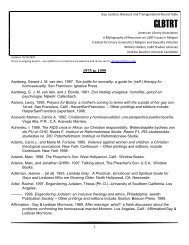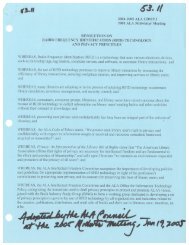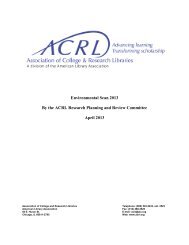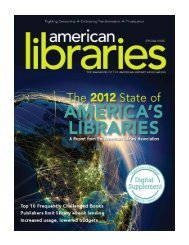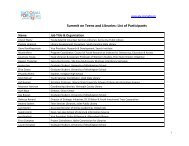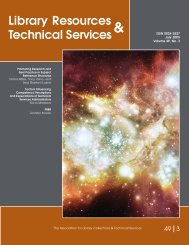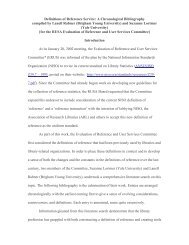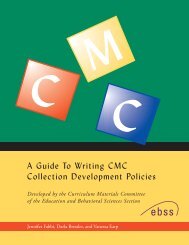The Campaign for America's Libraries - American Library Association
The Campaign for America's Libraries - American Library Association
The Campaign for America's Libraries - American Library Association
You also want an ePaper? Increase the reach of your titles
YUMPU automatically turns print PDFs into web optimized ePapers that Google loves.
“Exciting Sports-Related Marketing: A Game Plan” by Robert H. McDonald, JoAnn Sears, and Cindy<br />
Mitchell (Auburn University <strong>Libraries</strong>, Ala.), Marketing <strong>Library</strong> Services, Vol.15, No.1, January–<br />
February 2001. www.infotoday.com/mls/jan01/mcdonald.htm<br />
“Writers in the <strong>Library</strong>: Literary Programming on a Shoestring” by Steven R. Harris (University of<br />
Tennessee), C&RL News, June 2002.<br />
<strong>The</strong> media are key to any outreach ef<strong>for</strong>t. Almost every institution has newspapers, newsletters, and other<br />
publications <strong>for</strong> students, faculty, and administrators. Some also have radio or TV stations. If many<br />
students live off campus or an event is open to the public, you may want to include community media in<br />
your outreach.<br />
In reaching out to the media, make sure you know and follow your institution’s policies and procedures.<br />
You also will want to explore whether/how the Communication Office can assist you in working with key<br />
media. See “Allies in Getting the Word Out” <strong>for</strong> suggestions on how to work in collaboration with your<br />
institution’s communication staff. For resources on dealing with the media, see the ALA Online Media<br />
Relations Toolkit compiled by the ALA Public In<strong>for</strong>mation Office under “More Tools.”<br />
Knowing the needs and opportunities each medium presents will save you time and energy and make <strong>for</strong><br />
a better reception on the part of those you are approaching. For example, because of time and budget<br />
limitations, radio and TV news coverage is generally limited to items of major importance to the station’s<br />
audience. Be selective when sending news releases and be sure to identify key spokespeople and how<br />
they can be reached. For television, specify a visual element.<br />
Producers of talk shows often are looking <strong>for</strong> guest experts to interview on topics of wide interest, e.g.,<br />
“Myths about the Internet”/”What the Internet can and can’t do.” Propose—and deliver—an intriguing<br />
topic and dynamic guest, and you may be asked to return.<br />
Don’t <strong>for</strong>get to take advantage of student radio stations and news publications! Providing a list of talking<br />
points ahead of time can help set the stage <strong>for</strong> a successful interviewer.<br />
Sample publicity materials are provided to help get the word out about your library. Read them carefully,<br />
fill in the blanks, and add in<strong>for</strong>mation about specific programs and services. For your convenience, the<br />
documents also can be downloaded at www.ala.org/@yourlibrary. Click on “ACRL Academic and<br />
Research <strong>Library</strong> <strong>Campaign</strong>” and then “Media Relations.”<br />
Media Relations<br />
Sample News Release<br />
Tied to the beginning of the school year, the press release below is intended <strong>for</strong> the student newspaper.<br />
You will want to check on deadlines and whether it is best to mail, fax, or e-mail copy. Also, follow up<br />
with a phone call to make sure it was received and whether there are any questions. Remember, that even<br />
if the release isn’t used, it may inspire a feature story by a staff writer. If the paper is responsive, you<br />
might want to suggest a regular column.<br />
For release: [date]<br />
28



